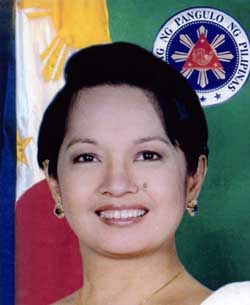Philippines' Arroyo hanging on by a thread again
A true political survivor, President Gloria Macapagal Arroyo is once again negotiating treacherous waters, trying to quell a crisis rife with symbolism without further alienating public opinion or the restive military. One false move, and she could find herself out of the Philippines presidential palace or worse.

Declaring a state of emergency Friday was a desperate gamble in a country where any suggestion of a move toward authoritarianism evokes memories of the human-rights abuses common under late dictator Ferdinand Marcos' martial law rule. "I think the president has just jumped from the frying pan into the fire," said Ramon Casiple, executive director of the Institute of Political and Economic Reform. "This is really a `no return' type of an action."
But Arroyo appears to have had little choice, facing a possible military-led coup that could have easily turned bloody and the prospects of her opponents trying to turn 20th anniversary commemorations of the first "people power" revolt that ousted Marcos into the country's third popular uprising. She has managed to quell both, at least temporarily. The question is: At what cost and for how long?
Military chiefs have declared their loyalty while saying they rooted out a coup plot in which Arroyo would have been arrested or possibly even killed, according to documents the chiefs said they seized recently that laid out the coup plans.
She showed a velvet glove over an iron fist when she ordered riot police to disperse two demonstrations Friday, first with water cannons, then with truncheons, but allowed former President Corazon Aquino to skirt a hastily-imposed ban on commemoration ceremonies.
The thousands of security forces who hit the streets with special orders to meet any unrest with force let Aquino an icon of democracy and her followers march for a wreath-laying ceremony at a monument to Aquino's late husband, Benigno, a revered figure in the struggle against Marcos.
But the military has shown itself to be easily capable of shifting loyalties and political adventurism. And Aquino, a longtime Arroyo friend and confidant, reiterated her call for the president to make the "ultimate sacrifice" and resign for the good of the country.
Arroyo has gone from crisis to crisis during five years in power. Supporters of her predecessor, Joseph Estrada, tried to storm the presidential palace after she had him arrested in May 2001, and military officers demanding her resignation and military reforms briefly seized a swank office and residential complex in 2003.
In between, she has dealt with an impeachment attempt, terror attacks, longrunning communist and Islamic separatist rebellions, and a string of natural disasters. The timing of the third attempt to unseat Arroyo was a good strategic move by the disparate and shadowy financial backers of efforts to unseat her. The majority of Filipinos live below the poverty line, but politics are contested by the country's elite, who switch sides often.
It allowed protest leaders to question why the president would crack down on public dissent when that was the force which carried her to the presidency when the second "people power" revolt ousted her predecessor, Joseph Estrada. The opposition's real problem is that it doesn't really have anyone to rally around. Its presidential candidate, popular action film star Fernando Poe Jr., died of a stroke six months after the tightly contested 2004 election that Arroyo's critics claim she stole, reports the AP.
N.U.
Subscribe to Pravda.Ru Telegram channel, Facebook, RSS!




